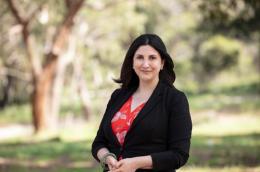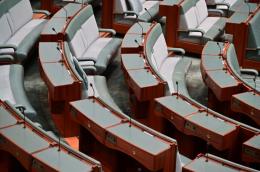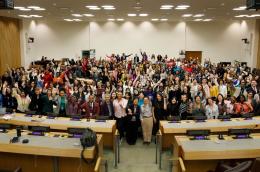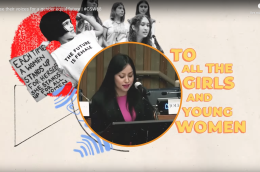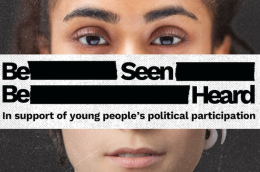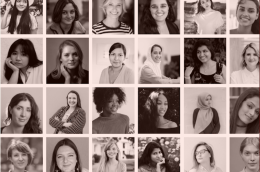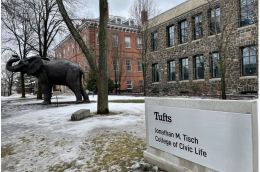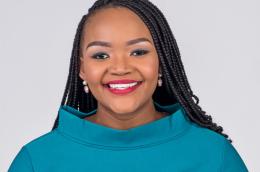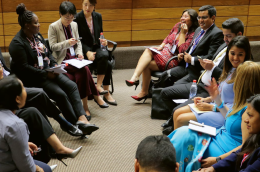Youth
Main navigation
Recent research has revealed some stark findings that young women are put off entering parliament and working in politics.
Despite the fact that the Australian government has achieved gender parity (although not across the entire parliament), and there have been well publicised reforms to the parliamentary workplace as a long-needed response to a disgraceful history of documented abuse, the research shows that that young women are reluctant to be a member of parliament.
The interviews conducted with young women and men regarding their ambitions are insightful. The published research illuminates the extent to which gender stereotypes and the performance of politics in public spaces have the result of dissuading young women from even contemplating participation in politics and political discussions, let alone pursuing a path to become a politician.
As a millennial who has recently been elected to the House of Representatives, there is much that I relate to in both the apprehensions of young women entering politics as well as my own experience in politics. I joined the Australian Labor Party around 20 years ago. It is an uncomfortable reality that I found it hard to participate: Young Labor seemed very male-centric, I frequently felt like I didn’t fit in. I remember volunteering on a campaign and being called in urgently to the office one day to fix up mistakes made by the paid campaign staff, who were all young men.
Read here the full article published by the Women’s Agenda on 19 April 2024.
Image by Women's Agenda
.
One hundred and twenty-two years after women in Australia won the right to vote and stand for parliament, it’s fair to say we’ve come a long way on women’s representation in politics.
In 2024, women make up 38 per cent of the House of Representatives, while 57 per cent of Senators are women.
But if we look a bit closer, there are plenty of issues preventing Australia from reaching total gender parity in federal parliament, and we remain a long way off changing attitudes so that the women who do end up sitting in a parliamentary chamber are treated equally to men.
Alarmingly, new research has confirmed there are still some pretty big barriers that are thwarting the political ambitions of young women. In a series of interviews with young people, it was clear that young women feel reluctant to become a member of federal parliament.
The study, led by Head of Politics and International Relations at Monash University, Dr Zareh Ghazarian, observed that gender stereotypes, women’s perceptions of their own knowledge and confidence, and the “toxic”, masculine culture of parliament were all preventing women from wanting to put their hands up for a career as an MP.
Read here the full article published by the Women’s Agenda on 15 April 2024.
Image source: Women’s Agenda
Last week, former prime minister Tony Abbott called for more women to be represented in the Australian parliament. While his comments were focused on the Liberal Party, they did remind us of the consistent gap that remains between the number of men and women in the nation’s parliament.
This is highly problematic, as a lack of women in the national legislature suggests our political system is misfiring.
The inequality of gender representation also undermines the democratic notion of government being for the people, by the people.
This problem isn’t unique to Australia, as many other countries continue to have fewer women than men representing the community in the national parliament.
Australia became a world leader when, in 1902, women gained the power to vote, and also stand for election to the parliament of Australia. But it took more than 40 years until, in 1943, Enid Lyons and Dorothy Tangney became the first women elected to the national parliament.
The situation has changed since the 1940s, but we’re still a long way from enjoying gender parity in parliament. For example, at the start of 2024, Australia was ranked 37th in the world for the percentage of women in its national parliament, with just 38% of seats in the House of Representatives (where governments are formed) being held by women. The story is somewhat better in the upper house, as 57% of seats are occupied by women.
Read here the full article published by the Monash University on 15 April 2024.
Image source: Monash University
Three quarters (77%) of women are not comfortable expressing political opinions online because of fears they will be targeted by harmful online behaviours such as misogyny, trolling, threats and harassment, according to new research published today (Wednesday 20 March) at AI UK, the UK's national showcase of data science and AI hosted by The Alan Turing Institute.
The survey found that while men and women reported seeing harmful content online almost equally overall, women reported being directly targeted by misogyny, cyberstalking, cyberflashing, eating disorder content, and image based sexual abuse to a significantly greater extent than men.
Women are also significantly more fearful of experiencing every type of harm that they were asked about.
The research also found that women were 96% more likely than men to say they had been left feeling sad or low as a result of an online experience, and 47% more likely than men to say they had been left with physical symptoms such as insomnia or headaches.
The research also looked at the use of safety tools and across all seven tools surveyed, including disabling location sharing, making accounts private and limiting who can engage with posts, women consistently report using these tools to a greater extent than men. This could suggest that women feel the need to do more to protect themselves from online harms.
Click here to read the full article published by The Alan Turing Institute on 20 March 2024.
Image source: The Alan Turing Institute
After an invigorating three-day assembly, the CSW68 Youth Forum, held on 15–17 March 2024, closed with renewed commitments and actionable insights. Aligned with this year’s Commission on the Status of Women priority theme, “Accelerating the achievement of gender equality and the empowerment of all women and girls by addressing poverty and strengthening institutions and financing with a gender perspective”, the Forum stood as a beacon for young voices ready to echo through the halls of global decision-making.
Meaningful engagement and diverse voices
The Youth Forum brought together a vibrant mosaic of more than 400 young leaders from across the globe, ranging from activists to experts with a rich diversity of experiences, including adolescents, young people with disabilities, indigenous youth, LGBTIQ+ youth, and more, adding depth to the dialogue on poverty eradication and galvanizing efforts to push forward for gender equality.
“It is high time that we stop thinking about you as the leaders of tomorrow and start working with you as the leaders of today”, said UN Women Executive Director Sima Bahous.
Read here the full article published by UN Women on 20 March 2024.
Image source: UN Women
Youth leaders from around the world have come together to discuss their vision for ending poverty and advancing gender equality at the 68th session of the Commission on the Status of Women (CSW68) at the UN Headquarters in New York from 11 to 22 March. In this landmark election year, when 2.6 billion people are expected to cast their votes, young people – as voters, community members, and leaders – hold the power to demand higher investment in gender equality in countries, regions, and globally.
Here are the voices from some young women leaders attending CSW68 and the annual Youth Forum, reflecting on their priorities, challenges, and hopes.
Read here the full article published by UN Women on 18 March 2024.
Image source: UN Women
